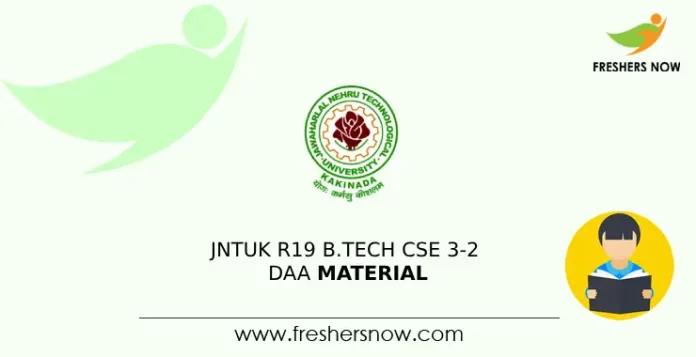
JNTUK R19 B.Tech CSE 3-2 DAA Material/ Notes PDF Download: Our JNTUK R19 B.Tech CSE 3-2 DAA Material covers everything you need to know about analyzing and understanding algorithms. Learn how to calculate time complexities effectively, and explore different problem-solving approaches through practical examples.
We’ll also guide you through theoretical concepts like finding lower bounds for algorithms and understanding NP-completeness, ensuring you have a solid foundation in algorithm analysis. With easy-to-follow notes and downloadable PDFs available, mastering DAA has never been easier!
JNTUK R19 B.Tech CSE 3-2 DAA Material – Units
| No. Of Units | Name of the Unit |
| Unit – 1 | Introduction, Basic Traversal & Search Techniques |
| Unit – 2 | Divide and Conquer, The Greedy Method |
| Unit – 3 | Dynamic Programming |
| Unit – 4 | Backtracking, Branch, and Bound |
| Unit – 5 | NP-Hard and NP-Complete problems, String Matching |
Unit 1 Syllabus PDF Download | JNTUK R19 B.Tech CSE Design and Analysis of Algorithms Material
Introduction: Algorithm Definition, Algorithm Specification, Performance Analysis, Performance measurement, Asymptotic notation, Randomized Algorithms. Sets & Disjoint set union: introduction, union and find operations.
Basic Traversal & Search Techniques: Techniques for Graphs, connected components and Spanning Trees, Bi-connected components, and DFS.
| JNTUK R19 B.Tech CSE 3-2 DAA Material – PDF Download | |
| To Download The JNTUK R19 B.Tech CSE 3-2 DAA Unit 1 Notes PDF | Download PDF |
Unit 2 Syllabus PDF Download | JNTUK R19 B.Tech CSE Design and Analysis of Algorithms Material
Divide and Conquer: General Method, Defective chessboard, Binary Search, finding the maximum and minimum, Merge sort, Quick sort.
The Greedy Method: The general Method, container loading, knapsack problem, Job sequencing with deadlines, minimum-cost spanning Trees.
| JNTUK R19 B.Tech CSE 3-2 DAA Material – PDF Download | |
| To Download The JNTUK R19 B.Tech CSE 3-2 DAA Unit 2 Notes PDF | Download PDF |
Unit 3 Syllabus PDF Download | JNTUK R19 B.Tech CSE Design and Analysis of Algorithms Material
Dynamic Programming: The general method, multistage graphs, All pairs-shortest paths, single source shortest paths: general weights, optimal Binary search trees, 0/1 knapsack, reliability Design, The traveling salesperson problem, matrix chain multiplication.
| JNTUK R19 B.Tech CSE 3-2 DAA Material – PDF Download | |
| To Download The JNTUK R19 B.Tech CSE 3-2 DAA Unit 3 Notes PDF | Download PDF |
Unit 4 Syllabus PDF Download | JNTUK R19 B.Tech CSE Design and Analysis of Algorithms Material
Backtracking: The General Method, The 8-Queens problem, the sum of subsets, Graph coloring, Hamiltonian cycles, and knapsack problem.
Branch and Bound: FIFO Branch-and-Bound, LC Branch-and-Bound, 0/1 Knapsack problem, Traveling salesperson problem.
| JNTUK R19 B.Tech CSE 3-2 DAA Material – PDF Download | |
| To Download The JNTUK R19 B.Tech CSE 3-2 DAA Unit 4 Notes PDF | Download PDF |
Unit 5 Syllabus PDF Download | JNTUK R19 B.Tech CSE Design and Analysis of Algorithms Material
NP-Hard and NP-Complete problems: Basic concepts, Cook’s Theorem.
String Matching: Introduction, String Matching-Meaning and Application, Native String Matching Algorithm, Rabin-Karp Algorithm, Knuth-Morris-Pratt Automata, Tries, Suffix Tree.
| JNTUK R19 B.Tech CSE 3-2 DAA Material – PDF Download | |
| To Download The JNTUK R19 B.Tech CSE 3-2 DAA Unit 5 Notes PDF | Download PDF |
JNTUK R19 B.Tech DAA Material – Outcomes
- Understand Asymptotic Notation: Familiarize with asymptotic notation, a mathematical tool used to analyze algorithm performance as input size grows, providing insights into how algorithms scale.
- Analyze Time Complexity: Evaluate the time complexity of algorithms, both recursive and non-recursive, using asymptotic notation to express how their runtime changes with input size.
- Explore Algorithmic Approaches: Learn about various algorithmic strategies, including divide and conquer, greedy, dynamic programming, backtracking, and branch and bound, each offering distinct methods for problem-solving.
- Solve Problems: Apply algorithmic approaches to tackle real-world problems efficiently. Utilize divide and conquer for breaking down complex tasks, greedy for making optimal choices at each step, dynamic programming for solving overlapping subproblems, backtracking for exhaustive search, and branch and bound for solving optimization problems.
- Understand Complexity Theory: Gain insights into NP-Completeness theory and lower bound theory, understanding the inherent difficulty of certain problems and the limitations of efficient algorithms, essential for evaluating algorithmic solutions and problem-solving strategies effectively.
For more details about JNTUK R19 B.Tech CSE 3-2 DAA Material and other materials follow our official website Freshersnow.com.



